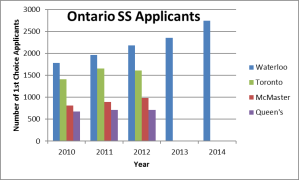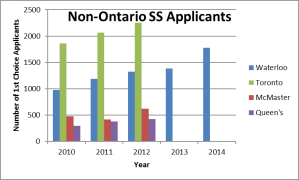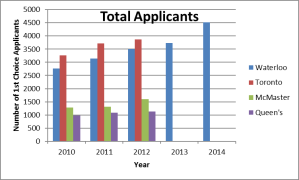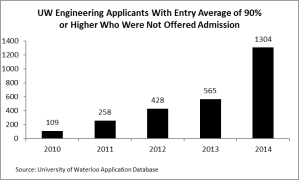Many people are aware that the competition to get into engineering programs has been rising in recent years. This is often seen in the rising admission averages required to get an offer, due to this increased level of competition. Although many people acknowledge this, they may be surprised at some of the numbers so I’ve compiled some graphs to help visualize it. First, let’s look at application numbers to engineering programs.
The data here is for 1st choice applicants to several of the most popular Ontario engineering schools, which can be obtained from CUDO. Unfortunately the 2013 and 2014 data is not available yet, although I’ve estimated what I can for Waterloo. I use the 1st choice numbers, because these represent individual applicants, who presumably really want to go to that school. So, first let’s look at the applications from Ontario Secondary School students over the past 5 years.
Over 5 years, we see the 1st choice applications to Waterloo rising from about 1,700 to 2,700. Over the same period, our capacity in Engineering only increased by perhaps a few dozen, therefore much more pressure/competition for those spaces. We see some rise at the other schools too. Interestingly, Waterloo has been the most popular choice among Ontario residents for Engineering since before 2010.
Now let’s look at the trends for applications from outside Ontario:
Again we see at Waterloo a rise from about 1,000 1st choice applicants, to 1.750 in 2014. Also of interest is that Toronto is the most popular destination for applicants from outside Ontario.
If we put the two together, we can see the total rise in 1st choice applicants:
So overall at Waterloo, a rise from about 2,700 to 4,500 1st choicers over the past 5 years. To put it in context, we only have about 1,500 available spaces.
To illustrate the effects of this increase in competition, we compiled data on the number of applicants (1st choice + all the others too), who had a 90% admission average or greater, and who did not get any offer to Engineering, and the results are somewhat shocking.
So back in 2010, about 100 applicants with a 90%+ average didn’t get an offer. Most of those were likely due to English language proficiency problems. But in 2014 the increased competition has resulted in over 1,300 in the same situation. The English language proficiency issues have not increased significantly, so most of these are just not getting offers because there are too many other applicants with a bit better stats.
We can see now why so many applicants with very good grades were shocked to be refused admission to Waterloo in the past year or two. A few years ago, a 90%+ average almost guaranteed an offer to Waterloo, but no longer. So this is the situation we’re dealing with, and some future posts will describe some ideas, along with updated insight into the 2015 admission cycle.




In my opinion, this kind of information feeds and displays many myths and those myths are proving extremely costly to Ontario society. I’ll mention three of them.
Myth 1: A 90 average from high school means something. I know from direct experience that it does not. As, by some measures, a top-1% student in my grade-9-to-12 Ontario high school, a top-1% student in my grade-13 Ontario high school, and a top-1% student in my undergraduate engineering class at Waterloo, I don’t recall ever achieving a yearly or overall average of 90 or higher. I have not observed the top students today as all that different from the top students of my era. Just the grades awarded and the destructive self-imposed atmosphere of competition among some of them. The most obvious observation about Ontario high schools from the perspective of a university professor is that they don’t have much of either of the two best known quality-increasing mechanisms (see myth 2) but do have one of the worst known political structures for quality, a culture of central control around expert consultants. I guess the root of the myth is that there is some body of knowledge which will make you perfectly prepared for something. Sorry, there isn’t.
Myth 2: Universities vary significantly in quality. They don’t. There’s a magic formula for quality which all universities deserving of the name follow: Individual academic freedom plus openness to serendipity equals world-leading results. The two most destructive influences on Waterloo Engineering on those fronts are easily shown to be the Ontario Government and Engineers Canada, both of them because they attempt to impose top-down authoritative structures which gum up the workings of our quality-control mechanisms. University rankings feed this myth. University branding feeds this myth. The influence of these on students applications (as illustrated here) feeds this myth. It’s a near perfect positive-feedback circle well known to advertisers. The real truth is that any university anywhere in the world which is funded above the threshold needed for academic freedom and openness to serendipity, which directs its funds to those ends on a quality-striving basis, and which has no political interference to its communications with the rest of the world, will be world class. That’s the magic of this centuries-old recipe. It is also Ontario’s competition.
Myth 3: University education is costly so it’s really important that the student spend his/her tuition dollar wisely. In reality, the cost of the most powerful known quality drivers is low and dropping. Somewhere around 30% of the operating cost of the University of Waterloo is professors’ salaries and those salaries in real dollars are dropping because of supply and demand. The main protection of quality now comes from faculty associations which professors, for the most part, pay for out of their own earnings. Unfortunately, the percentage of teaching done by people with protection of their academic freedom and enabling of their openness to serendipity is too low (near 70%) and dropping. The cost of fixing this problem is also very low and has been estimated near $75 to $100 per year per person in Ontario. That’s much less, for example, than the voluntarily assumed cost of the change in coffee-consumption habits which has occurred over my career so far. It’s also well known that the money spent comes back and then some. And then some more. If Ontario universities had those few dollars directed towards the two best known quality-enhancing mechanisms, it wouldn’t matter very much which engineering school in Ontario a student attended and everyone in Ontario would be richer.
George Freeman,
Associate Professor, Electrical and Computer Engineering
Past President, Faculty Association
University of Waterloo
Thanks for your comments and insight. Your “Myth 2” is especially significant. It’s disturbing to see the number of people who feel their lives will be ruined if they don’t get into Waterloo (or Toronto) engineering. I didn’t mean to cause more pressure, and I always point out that engineering programs across Canada are of similar content and quality, in my opinion.
Hi Professor,
Do you have any details of those rejected how many students with 90% averages were international students and how many out of province?
Thanks
No, I didn’t compile that data.
Dear Professor,
Thank you very much for your posts.(Your blog helped me a lot in getting admission to my son, in Mechatronics Engineering in UW this year).As per the data, University of Toronto is most popular destination for non Ontario students.Its just because of university rankings ?University of Toronto is way a head in rankings ? My question is why UW lagging behind in University rankings ?
Thanks
Boppe
I don’t know for sure, but I would guess that Toronto has a more established “brand recognition” outside of Ontario, because it’s a large university, in a well-known city, and approaching 200 years old. Waterloo is a medium sized university, in a smaller city, and only 57 years old. The same probably holds for rankings, which are largely based on reputational surveys.
U of T is a better known name outside Canada because it has been in the top positions for the international rankings for a while, at least 10 years in various programs.
As a consequence a lot of the stronger foreign students are attracted to U of T. If they can gain admission and they make the effort to attend university in a foreign country then they want to have not only the expertise but a diploma from a university that’s instantly recognizable internationally and therefore can help them sell themselves in any labour market, not necessarily only in Canada.
It may also easier to find information and aquintances that can help a bit at the beginning in a big city like Toronto.
Yes, good point…they may have friends or connections with others in Toronto, or known others who went there. Also, Waterloo Engineering only started taking international undergraduate students in the mid-2000’s, and we take very few each year (typically less than 200), so our international recruiting has not been as aggressive as at other places.
Hi there.
I’m a high school student hoping to get in to SoftEng next year. You mentioned issues of English language proficiency potentially impacting one’s chances of admission. Would this be regarding the OSSLT, or actual English class marks? I will realistically earn a 90% in English; would that be sufficient?
Thank you for all the information you post for prospective students. It is incredibly helpful!
By English proficiency, I mean the TOEFL or IELTS tests that people may have to submit if English is not their first language.
Very informative post as usual. Thanks for being so transparent with university data and providing applicants with as much information as possible. I think I speak for most when I say we really appreciate it!
If you don’t mind, I’d like to ask a bit more of a general question: In engineering classes, is there a limit or a desired percentage of how many students can get A’s/B’s,etc.? Are grades ever “adjusted” down or up because class averages are too high or low?
There are no target numbers for grades in Engineering. There is probably a common understanding that typical course averages fall in the high 60s to mid 70s range, but this is not a formal policy. Our grades are similar to other Canadian universities.
Hey prof,
This is unrelated, but for 2015, my mid-term marks are scheduled to arrive on April 9 2015. I go to a school in B.C., so this is very tentative because of the teacher’s strike. Nevertheless, when are my grade 12 2nd semester mid term marks due for Waterloo, as of right now? Despite my effort, I was unable to find relevant resources on the website; if you can be kind enough to shed some light on this, It would be greatly appreciated.
Thanks!
I’m not exactly sure either. Just submit as soon as you can in April and it should be fine. There are lots of people in the similar position.
How will Waterloo be able to choose the best applicants from Ontario when the main admission criteria is the high school marks averages?
High school averages can vary quite a bit from high school to high school in terms of what kind of competence in the subject they represent. Especially if we are talking not choosing between a 87% student and a 92% student but between a 93% and a 95% student.
Among high school students and parents the message out there about university admissions is that only the marks count.
This is triggering a race towards the easier marked courses for grade 12. For example in GTA, the enriched programs – other than IB – stop in grade11 or their enrollment dwindles down dramatically for grade 12. Why? Because the perception is that is easier to get higher marks in academic. Similarly there are gifted students who choose to take academic grade 12 and not to continue taking gifted grade 12 for the same reason. Then if some students switch their friends switch too. And so on and so forth. I’ve even heard parents who consider having their children switch to an “easier” high school for grade 11 and 12; don’t know whether they actually followed through or not.
Engineering is beautiful but is definitely not easy. Why on earth would we have a system that discourages young people at 17, 18 when their minds are open to the world and still very very flexible and trainable from taking chances and learning as much as they can?
Admissions exams would be more transparent and would stop this race to the bottom for Ontario students.
I fully realize that this is a system problem and not Waterloo’s problem only. I’m only bringing it up here because my son wants to be an engineer and of course he is very interested in Waterloo.
Yes, this is something we continually struggle with, trying to stop it from becoming a simple game of grades. Admissions exams have their own set of problems, but we don’t have the resources to set up and administer them. We’re implementing some small changes that I will describe in the near future.
Hello Mr. Anderson,
* From the information it receives, does Waterloo admissions know which high school an applicant attended?
* Well, yes, no system is perfect.
However admission exams would at least set clear expectations and stop the race to the bottom.
Moreover, if the number of applicants to Waterloo keeps growing at the same pace the sheer cost of looking in detail at each application will force Waterloo admission to apply some screening step.
The only screening that is simple enough to apply and to perhaps automate are the marks and perhaps keywords in the AIF.
So right of the bat when Waterloo will have to screen it will have to do so by marks. Which will work against the students who challenged themselves and took harder courses or attended the harder grading high schools.
For Waterloo it may not matter much. After all if good enough students are admitted is not so important whether or not they are the best of the lot.
For the boy or the girl who challenged themselves and worked harder than his or her friends it would be a bitter experience.
Don’t get me wrong. Life experiences have convinced me that high marks and technical competency are not everything; they are just a good start.
Being able to work with others and adapt and communicate are also necessary.
That’s why I was very impressed when I found out from your blog how at Waterloo each AIF is judged by several people with practical experience in the industry.
That must be expensive. It’s only a matter of time until Waterloo will have to screen.
Then what can the screening be based on? Marks.
Yes, we get information on which high school was attended, including if there were multiple schools, night school, summer school, private school, etc.
Hello Prof. Anderson,
How much consideration is given to Grade 11 marks (for Ontario HS applicants)? I did quite poorly (passing grade, but below 65) in my Grade 11 math course, however this year I am on track to get above a 95 in functions and over 90 in calculus, with other required marks also above 90%. My extracurriculars are also good, with school and sport involvement.
What weight will admissions give to my terrible Gr. 11 marks? Is it worth applying with that on my transcript?
Thank you.
In the May round of admissions (i.e. the main one), Grade 11 marks have little to no effect, so I wouldn’t worry about it.
Hi Professor,
Is the maximum AIF bonus always 5%, or are there extraordinary circumstances where an applicant has an outstanding AIF and is then given an AIF bonus greater than 5%?
Thanks
We are working on some changes to the AIF scoring, that I’ll describe in the next couple of weeks.
Hello Professor Anderson,
I am a Grade 12 student from British Columbia and am aiming to get into the engineering faculty at University of Waterloo. I am just wondering if taking online courses will affect my chance of getting admitted? I am planning to take English 12, which is English class at the grade 12 level, through the Vancouver Learning Network (VLN). However, it is not a repeated course, and I’ve never taken a repeated course before.
This website says that UW might adjust applicants’ overall admission score if they have taken courses outside day school. https://uwaterloo.ca/find-out-more/admissions/repeated-courses
Thank you in advance. I really appreciate your help.
Regards,
David
No, there is no penalty for online courses. An adjustment might be made if there seems to be an odd boost in grades, but this probably won’t apply to most people.
Hi prof,
I know you are always reluctant to say a specific grade, due to the changes every year but I always like working with a specific target in mind. So what mark would you say I would need to aim for to get into soft eng at UW? (My EC’s are pretty good [interned for a month and a half at a software company, head of investment club at school etc.] but no awards or anything spectacular like that. So saying that would you say a 93 should get me admission? Or should I be aiming higher?
Regardless, thanks a lot!
Aim for the best you can do. According to our latest chart, a 93 is good but by no means certain. (I always wonder: if you aim for a 93 and start getting higher marks, do you purposely make errors to bring it back down? 🙂
Hello Professor Anderson,
i completed gr. 12 English in summer school. I’ve heard that Waterloo reduces some marks for courses taken in summer school. Is this true?
We might apply an adjustment, which I’ll explain in an upcoming post.
Pingback: Chances for 2015 | A Professor in Waterloo Engineering
Hello Professor Anderson,
I’m applying for Waterloo Architecture (I know this is a Engineering information site, but I was wondering if you could give me some pointers in terms of admissions.) and my first term marks at school have been finalized (which are the ones I send to Waterloo.).
I have a 95 in Pre-Calc 12, 90 English 12, 86 Calculus 12 and 95 Physics 12. I do Physics 12 and Pre-Calc 12 online (I will provide a reason in the AIF.).
I believe I’m confident with these grades to get an interview for the Architecture program. However, my grade 11 grades were a totally different story (67 Eng 11, 75 Pre-Calc 11, 84 Physics 11.). Do you think Waterloo will not give me an offer to the interview due to these Grade 11 marks? I know that you may not know a lot about the Architecture admissions process (Unless your part of that too haha) but I was just wondering if you could answer my questions as a admission staff member.
Thank you very much in advance.
No, I know virtually nothing about Architecture’s decision-making process.
Pingback: Lab #1 | 19andreab96
Pingback: University of Waterloo | Educoncanada